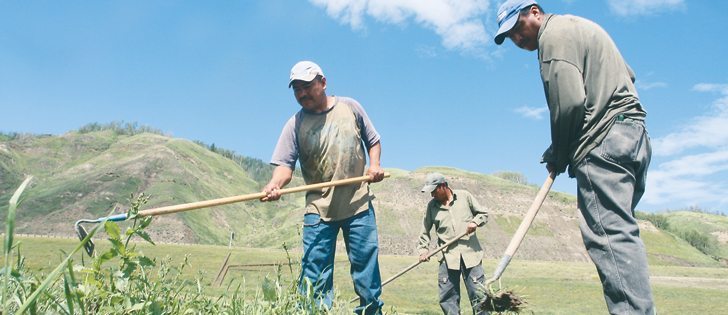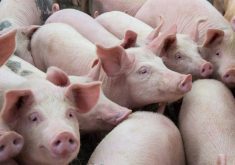Cal Penner noticed about a decade ago that it was getting harder to retain employees at his hog farm northwest of Winnipeg.
The young men who worked briefly for Penner left for a variety of reasons. Some didn’t like the dust inside the barns. Others didn’t care for the smell.
One employee, though, had a memorable reason for quitting.
“I had one guy say he didn’t like to sweat when he worked,” Penner said.
“Well, good luck with that.”
Read Also

American researchers design a tomato plant that talks
Two students at Cornell University have devised a faster way to detect if garden plants and agricultural crops have a sufficient supply of nitrogen.
Penner laughed while sharing that anecdote, but he said a lack of labour has become a serious issue for independent hog producers in Manitoba.
“It would be nice if we could fill the jobs with Canadians, but this next generation that has come along, it’s not for them,” said Penner, who farms near Argyle, Man.
With the exception of Hutterite colonies, most Manitoba hog farmers now depend on foreign workers.
“I don’t have the stats, but I would say over 50 percent of the workers in hog barns in the province would be foreign workers of some type,” said Penner, who has two employees from the Philippines.
“Even the Maple Leaf barns, Hylife … I would think they’d be a very high (percentage) of foreign workers.”
The federal government imposed a moratorium last week on temporary foreign workers in the restaurant and food services industry, following highly publicized incidents in which McDonald’s allegedly abused the temporary foreign worker program.
CBC reported that three McDonald’s in Victoria hired temporary foreign workers from the Philippines and gave those workers more shifts than local employees.
In a separate incident, the Sask-atchewan Federation of Labour said the Brothers Classic Grill and Pizza in Weyburn, Sask., also abused the program. The federation said the hotel fired two waitresses with a combined 42 years of service and replaced them with temporary foreign workers.
The federal government will not process any applications to the temporary foreign worker program from restaurant and food services industry until it reviews the program.
Unions and the C.D. Howe Institute may claim the temporary foreign worker program increases Canadian unemployment, but hog producers and beekeepers in Western Canada say they couldn’t operate without foreign labour.
Paul Greidanus, a beekeeper from Morinville, Alta., relies heavily on foreign workers from the Philippines, Nicaragua and Mexico. He said beekeepers could be put in jeopardy if Ottawa’s new restrictions slow the flow of foreign workers.
“You hear one or two bad stories, but that’s one out of many, many foreign workers who are in (Alberta),” said Greidanus, who has hired foreign workers from Mexico and Nicaragua for 30 years.
“I’m getting 12 guys in this year (from Nicaragua)…. If we couldn’t get foreign workers we would have to downsize, a lot.”
Temporary foreign workers represent 50 to 60 percent of all apiary employees in Western Canada. The percentage is even higher in Alberta: 65 to 75 percent.
Beekeepers bring in foreign workers for six months because they can’t find locals to do the seasonal work.
“The farming families in the countryside are gone,” said Bruce Podolsky, a honey producer from Ethel-bert, Man. “It’s all big farmers so there are very few young people around.”
Beekeepers and hog producers must post help wanted ads in local and regional publications, to prove there are no applicants before re-cruiting foreign workers.
“We have to advertise the job in three sources, for about half a year, before we can start applying (for temporary foreign workers),” said Greidanus, who is also chair of the Alberta Beekeepers Commission’s labour committee. “We have to show we’re doing our due diligence, trying to get Canadian workers to do the job. Even with all the advertising we do, we rarely get a call about the job.”
Greidanus would hire Canadians if he could. He would even raise wages because recruiting foreign workers is expensive.
“One of the biggest misconceptions that we get… is we (hire foreigners) because it’s cheaper. It really isn’t. We have to house these guys, we have to fly them in … and we’re still paying them $14.30 per hour,” he said.
“If you add up all those things, I’d pay $20 an hour for a Canadian guy.”
Beekeepers typically hire foreign workers for six months, but hog producers use a different program. Penner recruited his employees from the Philippines, who came to Canada to stay.
“It’s an agreement that they work for us for a minimum of two years. Then they’re free to pursue whatever their heart desires (in Canada).”
Penner said he had to wait nine months before the federal government approved the application for the first employee. The second application took 11 months.
“We were short-staffed through both those periods of time,” Penner said, adding a lack of employees has become a chronic problem for Manitoba’s independent hog farmers.
“Discussions I’ve had with producers, they’re just very, very tired of … being short staffed for (extended) periods of time…. Each farm is only as strong as the people they have. If we have to go for months, or almost a year, short staffed, there’s a financial cost to that.”
Greidanus said the process is also torturous for beekeepers: applications must be submitted four or five months before workers arrive.
Penner is among the producers lobbying government to simplify the application process so that hog farmers don’t have to wait a year to hire a foreign worker. He would like to see a distinct program for agriculture that is separate from the temporary foreign workers employed at fast food restaurants and other occupations.
Beekeepers are also lobbying the government for a similar change so that long-time users of temporary foreign labour are placed in a different category.
Penner said politicians are concerned about the human resource challenges in the hog industry, but he doesn’t expect an immediate solution.
















